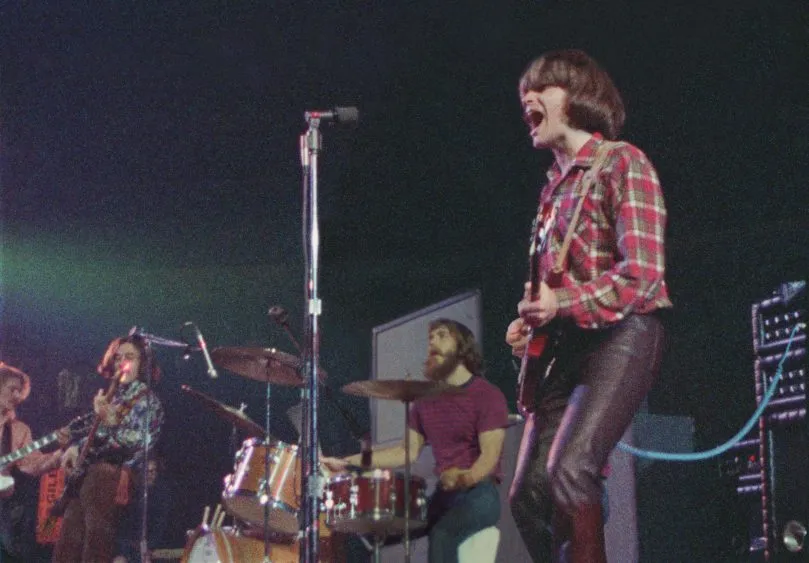
“Rude Awakening #2” is CCR’s strange little doorway into the unfamiliar—a final-track fog where the band’s certainty dissolves, and you’re left listening to unease itself.
The first thing to know—because it changes how you hear every second—is that “Rude Awakening #2” isn’t a “lost hit” or a buried single waiting for rediscovery. It’s the closing instrumental on Pendulum (released December 1970), and it stands there like a dim hallway light left on after everyone has gone to bed: unsettling, curious, and very unlike what people expected from Creedence Clearwater Revival at their commercial peak.
That context matters because Pendulum was still a major CCR moment. The album peaked at No. 5 on the Billboard 200, and its only single, “Have You Ever Seen the Rain” / “Hey Tonight,” hit No. 8 on the Billboard Hot 100. So when you arrive at “Rude Awakening #2” at the end of the record, you’re not hearing a band struggling for relevance—you’re hearing a band with the charts in its pocket, choosing (briefly, stubbornly) to step outside its own template.
On paper, the track is often described as a venture into avant-garde psychedelia, explicitly linked to the Beatles’ notorious sound-collage “Revolution 9.” One detailed fan-archive account even claims John Fogerty later remembered it as a “filler”—a kind of tongue-in-cheek parody of “Revolution #9”—starting with a haunting instrumental passage before tipping into experimental cacophony. (Even if you take the word “parody” cautiously, the family resemblance is hard to miss: the feeling of sound turning into a room you don’t fully understand.)
And that’s the emotional hook: CCR—the band of hard-edged grooves, clear narratives, and working-class immediacy—ending an album with something that refuses to explain itself.
It helps to remember what Pendulum represented internally. Retrospectives note that the band entered the studio intending to jam and experiment, and that approach didn’t naturally produce the kind of new songs they’d relied on before; Fogerty later regretted that method. At the same time, Pendulum is often described as an album where CCR broadened their sonic palette—more keyboards, more texture—while still trying to sound like themselves. In that light, “Rude Awakening #2” feels less like a prank and more like a tell: the sound of a band whose engine is still powerful, but whose steering wheel is starting to loosen.
There’s also a poignant historical shadow hanging over it. Pendulum was the last CCR album recorded while Tom Fogerty was still a member, before he left in early 1971. If you listen with that in mind, this closing instrumental starts to resemble a threshold—an ending that doesn’t announce itself with a goodbye, but with a strange mood: the sense of something breaking formation. Even critics who admired the album often singled the track out as an indulgence. Robert Christgau, for instance, praised Pendulum overall yet dismissed “Rude Awakening #2” as a “pretentious moment.” That criticism is useful—not because it’s “right,” but because it reveals how jarring the track felt in real time. CCR fans were used to songs that walked up, spoke plainly, and left. This one lingers in the doorway and mutters to itself.
So what does “Rude Awakening #2” mean?
Its meaning is less lyrical (there are no lyrics) and more psychological. It feels like the moment, late at night, when you wake up disoriented and realize the room you trust has shifted slightly—furniture moved, air changed, certainty gone. The word “awakening” suggests clarity, but the track offers the opposite: a rude return to consciousness where the mind doesn’t feel safe yet. And in the broader CCR story, that’s painfully apt. The band that had seemed unstoppable—tight, efficient, bulletproof—was moving toward fracture, even as the hits kept coming.
That’s why this odd little piece has stayed memorable for listeners who live with Pendulum instead of just sampling the singles. It’s a reminder that even the most direct bands sometimes carry hidden corners—moments when they let their guard down and admit, through sound, that they don’t have all the answers either. “Rude Awakening #2” isn’t there to please you. It’s there to unsettle you—gently, briefly, and honestly—before the record ends and you’re left with the silence, wondering what changed while you weren’t looking.